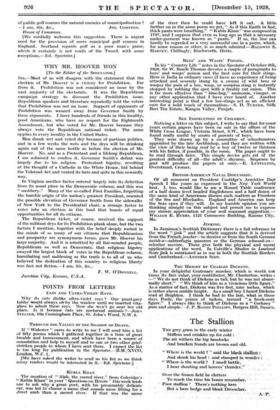POINTS FROM LETTERS
CATS AND ULTRA-VIOLET RAYS.
Why do cats dislike ultra-violet rays ? Our pearl-grey tabby would always sit-by the window until we inserted vita-. glass to admit these rays. Now she won't go near her old place. Is it because cats' are nocturnal animals ?--Joniv STELTKR; 10a Cunningham Place, St. John's Wood, N.W. 8.
London, W.C. 1.
[We have asked the writer to send us his list as we think many readers would be interested in it.—Ed. Spectator.] KUBL.4. KHAN
. The mention of " Alph, the sacred river," from Coleridge's ‘! Kubla Khan" in your "Questions on Rivers " this week leads one to ask why a great poet, with his presumably delicate ear, was led to choose a name that sounds more fitting fora Street arab than a sacred river: If that was the name THROUGH THE VALLEY OF THE SHADOW OF DEATH.
If " Widower " cares to write to me I will send him a list of fifty poems which I gathered together in a time of great trouble and bereavement, and which have been a source of consolation and help to myself and to one or two other grief- stricken people to whom I have sent them. I expect the list is too long for publication in the Spectator.—B.M.IXVCO, of the river then he could have left it out. A little further on in the same poem we get, " As if this Earth in fast, thick pants were breathing." " Kubla Khan " was composed in 1797, and I suppose that even as long ago as that a necessary under-garment was known as " pants." If so, the line can hardly be regarded as a very successful one in a poem, which, for some reason or other, is so much admired.—BALDwns S. HARVEY, Chillingly, Knebworth, Herts.
BEES' AND WASPS' POISON.
In his " Country Life " notes in the Spectator of October 6th, 1928, Sir W. Beach Thomas devotes a couple of paragraphs to bees' and wasps' poison and the best cure for their stings. Here in India in ordinary cases (I have no experience of being attacked and severely stung by a swarm of wild bees or wasps) the pain of a bee, wasp, or scorpion sting is instantly stopped by rubbing the spot with a freshly cut onion. This is far more effective than blue-bag," ammonia, vinegar, or any other application that I have ever heard of. Another interesting point is that a few bee-stings act as an efficient cure for a mild touch of rheumatism.—S. D. TURNER, Sidh Bari Tea Estate, Kangra Valley, Punjab.
SEX INSTRUCTION OF CHILDREN.
Noticing a letter on this subject, I write to say that for some years certain papers have been on sale in the offices of the White Cross League, Victoria Street, S.W. which have been found really useful by scores of parents of boys. They were drawn up by a committee of schoolmasters appointed by the late Archbishop, and they are written with the view of their being read by a boy of twelve or thirteen with his father, if possible, in the room. The paper ought to be read through twice. This simple device gets rid of the greatest difficulty of all—the adult's shyness. Sixpence by post will produce the papers at once.—E. LYITELTON, Overstrand, Cromer.
BRITISH-AMERICAN NAVAL DISCUSSION.
Of all comment on President Coolidge's Armistice Day Speech I like yours as expressed in the New York World best. I, too, would like' to see a Round Table conference of a half dozen level headed Englishmen and a half dozen of the same kind of Americans discuss such matters as Freedom of the Sea and Blockades. England and America can keep the Seas 'open if they will. In my humble opinion you are thinking straight on this subject and permit me to express my sincere appreciation of your well reasoned suggestion:— Wu mild E BYERS, 1121 Commerce Building, Kansas City, Mo.
JINXING.
. In Jamieson's Scottish Dictionary there is a full reference to the word " jink " and the article suggests that it is derived from the French joncher—to deceive or from the South German Swink-a=subterfugia quaerere or the German schwank-en= celeriter movere. These give both the physical and moral applications of the word. In Colville's Studies in Lowland Scats }ink is mentioned as in use in both the Scottish Borders and Cumberland.—A.NOTHER SCOT.
THE HEIGHT OF CHARLES DICKENS.
In your delightful Centenary number, which is worth ten times its face value, your contributor, Mr. Chesterton, writes : —" We do not think of Dickens as tall, but he was not abnor- mally short." " We think of him as a vivacious little figure." As a matter of fact, Dickens was five feet, nine inches, which is rather above middle height. As a small boy I heard Dickens read at Brighton. I think he had to, the last, what in those days Poole, the prince of tailors, termed ". a frock-coat figure." I always like to think of Dickens as a " Cockney " Pure and simple.—J. P. BACON PHILLIPS, Burgess Hill, Sussex.








































 Previous page
Previous page